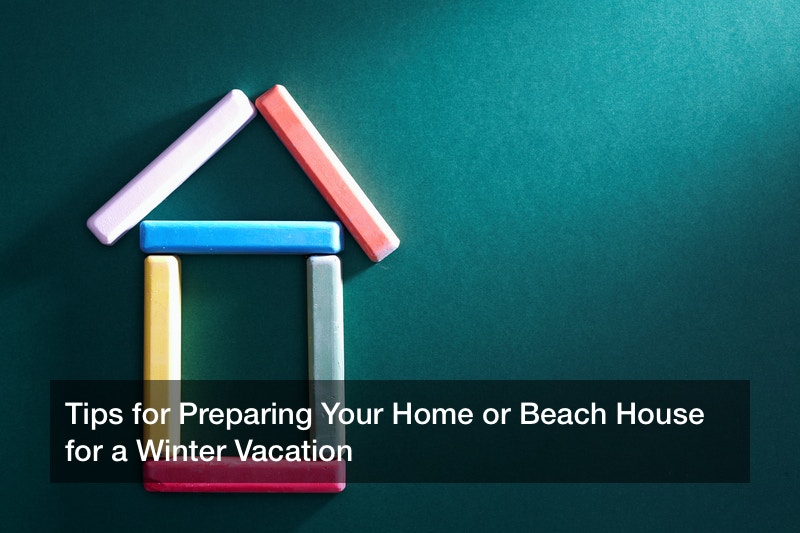Our website may receive compensation from partner links and videos placed in our content.
We are not experts in any particular field. Our content is written by those interested in the various topics, not by professionals. All content is intended to be informational and should not take the place of professional advice. Before making any decisions that could be life altering, please consult with a professional in the field.
It pays to set aside time to get ready before you leave your house for a vacation in winter. Leaking roofs, pest infestation, and security breaches can cause huge losses. However, many of those incidences are preventable by adopting a systematic approach. Here are some tips on preparing your home for winter vacation.
Preparing Your Home
Clean and Declutter Your Home
One of the simple steps you could take when preparing your home for winter vacation is decluttering and cleaning. When you leave items lying around, you are more likely to find your home dusty when your return. Foods can attract rodents, which can ruin your furniture and other valuables.
Start by putting away all the dishes around the house. Ensure you clean behind the fridge and cabinets where scraps of food may have fallen during the busy summer season. You may also remove the carpet and rugs for steam cleaning, especially if you have pets.
If there are already signs of rodents and fleas, you can only expect it to get worse while you are away. Consider using an all natural pest control to eliminate pests. Declutter your home by getting rid of food containers to avoid attracting mice and termites.
It is also advisable to clear areas outside your house and remove debris lying on your lawn. In winter, erratic winds can turn the pieces of debris into flying missiles. Storms can pick up tree branches and containers, and they can damage your roofing as well as the siding and gutters.
Your chimney accumulates soot and a toxic substance known as creosote. You should clean and inspect your beach house chimney to remove toxins and prevent fires. If you’ve not cleared it in recent months, ensure that you do it before you leave.
Plan for an HVAC Tune-Up
Keep the air in your interior clean by making a point of scheduling maintenance for your air conditioning systems. Your furnace and AC may have air leaks and debris in the vents and ductwork. It is better to have a tune-up before you leave your vacation house to limit any long term damage to your valued equipment.
A professional will clean the coils, replace the filter, and repair components that are faulty. It is often a prudent investment when you are preparing your home for winter vacation. It will help you avoid costly repairs in the future.
As you are preparing your home for winter vacation, also remember to adjust the settings on your thermostat. Set your device to around 50 degrees Fahrenheit to maintain reasonably warm temperatures. That will also mean you’ll have to keep your furnace running, but turned down to save on energy.
Protect Your Plumbing System
One of the biggest causes of burst pipes in your plumbing is freezing temperatures. When temperatures fall below 20 degrees Fahrenheit, it can raise the pressure within your pipes. This, coupled with the weakening of pipes due to contraction, can cause them to burst.
Even in areas that do not have extremely cold climates, the plumbing can crack and leak as temperatures drop. Some pipes do not have proper insulation, or they may be passing outdoors, and therefore prone to freezing. Pipelines going through the basement and attic may also require extra insulation.
Also, consider seeking residential plumbing services to address any existing leaks in your home. When the water goes through a cycle of freezing and thawing, the pipes will often develop cracks. Existing cracks will accelerate the damage to your plumbing.
Water pressure is another issue that a professional should address when preparing your home for winter vacation. A combination of high pressure and freezing will cause a cycle that will exacerbate any weak points in the pipelines. High pressure can also damage your water heating appliances and void their warranty.
While you may notice significant flooding while you are home, it may accumulate to devastating levels while away on vacation. Accumulation of water can weaken your foundation, forcing it to shift. A moving foundation can damage your plumbing and may cause the walls to crack.
You should also pay attention to signs of low water pressure as it could be an indication of leaky pipes. Your plumbing system may be worn out and could be calling for an overhaul. It is always a wise step to service your failing supply lines as it is more cost-effective than repairing broken pipes.
Address the Risk of Flooding
One common cause of flooding in your home is plumbing connections. Before leaving, examine the lines connecting to your hot water system and washing machines. If the water is trickling, tighten the joints, and replace old worn out-fittings.
Your piping may also have shown signs of clogging. Oil and detergents that have been poured into the drains may solidify and increase blockages within your system. Ensure you have cleared all drain lines before leaving.
You can turn off the main valve to minimize water loss through leaks or open taps. If you have an automated sprinkler, shut off the supply valves as you might not need it during winter. Also, ensure your sump pump is working to prevent flooding in the basement. You can test it by letting it run to determine if it is operating efficiently.
Also, your gutters and downspouts will need some maintenance work before you leave. You can begin by removing debris such as leaves and branches. Ensure the gutter installation and assembly is such that they drain a minimum of 10 feet away from the building.
Evaluate and Fix Water Damage
One of the worst things that can happen when you are away from home is water damage on your property. It is therefore wise to organize for a thorough evaluation as you are preparing your home for winter vacation. Check for dripping pipes in the shower and kitchen sink. A trickle can quickly add up to gallons of water in just a few weeks while you are on holiday.
Water damage can also trigger the growth of mold. Other times, the mold is already present only that it has not spread. Before leaving, ensure that you have consulted a mold prevention service to check for any signs of mold. Its spores can cause health problems and could permanently damage the walls and ceilings of your house.
Repair your Siding
As you are preparing your home for winter vacation, make a point of organizing for an inspection of your siding. A professional should check for moisture accumulation and pest infestation. Water can get into panels and could completely ruin the siding by the time you get back. Repaint and restore before the snow can trigger irreversible damage.
If you have had to repaint your siding frequently, there could be an underlying problem. Usually, you’ll only need to repaint it every eight to ten years. It could be that the material is allowing moisture through the cracks and holes in the material.
Wood siding can be an excellent choice, but it requires careful maintenance. If you do not adequately maintain it, you may notice paint and wallpaper in the interior walls peeling off. If moisture has already compromised the material, there could be mold growth, which can pose a health hazard.
Some signs that you need siding repair may include:
- Signs of peeling paint
- Cracks and holes in the siding
- Siding requires frequent repainting
- Signs of Pest infestation
If maintaining your wooden siding proves to be too much work for you, consider other less demanding options. Composite brick and vinyl are more durable and require minimal maintenance. They may be your ideal option for a beach house, which is constantly exposed to salty water.
Prepare Windows and Doors
You should try and leave your windows and door in impeccable condition when preparing your home for winter vacation. Organize for glass repairs if there are signs of cracks on the window. The repairs should include an evaluation of weather stripping and the insulation of your beach house.
Your wooden window frames may also have gaps that allow air to leak into the interior of your home. The air can introduce moisture, that could later damage parts of the structure and even valuables in your home. Additionally, it can have an impact on energy consumption. You may find high utility bills when you get back from your holiday break.
You can use heavy insulating fabric over the windows to keep your home warm throughout the winter. It also helps to uphold your privacy by preventing people from peeking into the house.
Unplugging your Electronics
Also, consider unplugging your appliances when preparing your home for winter vacation. Electronics can increase your home’s energy consumption even while on standby. According to the Fire Data Center, electronics on standby are also the fifth most common reason for fires.
Unplug devices, such as computers, heaters, and washing machines, as they often waste considerable amounts of power. However, you don’t have to unplug the water heater system. You can set it to run once a day to keep your home warm and prevent your plumbing from freezing.
There is also the risk of general electrical fires destroying your valued property. Electrical faults account for 51,000 cases of residential fires. It is also responsible for 500 deaths and more than $1 trillion lost in the United States.
If you notice any signs of faults, you should call your local electrical services provider to evaluate the connections. Therefore, do not ignore flickering lights as they could be an indication that your circuit is overloaded. Another sign of overloading is when your circuit-breaker is constantly tripping.
Keep Your Home Safe
When preparing your home for winter vacation, you should also take steps to stop opportunistic intruders. If you have deliveries to your home regularly, you may cancel or postpone your subscriptions. Newspapers and food deliveries piling up can be a sign that no one is home.
You can ask a friend to watch over your home, to create the impression of occupancy. They can use parts of your property by parking some of their cars in your driveway. Statistics show there are two burglaries every minute, and most happen during the day when nobody is home.
You can request a family member or a friend to oversee routine maintenance. You may assign them snow removal or to manage the repair of your siding to discourage intruders. However, some tasks are only necessary if you’ll be away for more than a week or two.
Make a point of locking up all areas of your home, including the exterior doors for the garage and backyard. If you have an automated system, disable it to limit the use of universal door openers.
If you do not already have a home security system, you should consider getting one for your beach house. It can make remote access more convenient and hassle-free. There are smart systems that can send you images and videos. That way, you can periodically check in on your home to ensure that everything is okay.
A smart home system might also have capabilities for adjusting the air conditioning systems. The software may have a feature that allows you to give access to parts of your residence. You can use this feature to assign a friend or neighbor to watch over your home. You may need someone water your plants or oversee work on your property.
If you already have the system, talk to your provider and let them know you’ll not be home. Your provider will raise its alert level in case there is a breach. If there will be people coming to housesit, you can inform them before you leave for the vacation. For a security policy to be effective, it will require thorough coordination and efficient monitoring.
In Conclusion
There are many tasks you should keep in mind as you are preparing your home for winter vacation. Give yourself time to prepare and create a checklist to ensure all areas of the house are covered. Thorough preparation will give you peace of mind. Your home will be safe and cozy as you’d want it to be when you get back.






